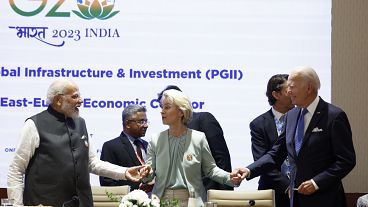By Christopher Johnson
LONDON (Reuters) - Oil prices rose on Tuesday as U.S. sanctions squeezed Iranian crude exports, tightening global supply despite efforts by Washington to get other producers to increase output.
Benchmark Brent crude oil was up 40 cents at $77.77 a barrel by 0950 GMT. U.S. light crude was up 5 cents at $67.59.
"The path of least resistance for oil prices, given the supply fundamentals, remains up," Harry Tchilinguirian, oil strategist at BNP Paribas, told Reuters Global Oil Forum.
Washington has told its allies to reduce imports of Iranian oil and several Asian buyers, including South Korea, Japan and India appear to be falling in line.
But the U.S. government does not want to push up oil prices, which could depress economic activity or even trigger a slowdown in global growth.
U.S. Energy Secretary Rick Perry met Saudi Energy Minister Khalid al-Falih on Monday in Washington, as the Trump administration encourages big oil-producing countries to keep output high. Perry will meet with Russian Energy Minister Alexander Novak on Thursday in Moscow.
Russia, the United States and Saudi Arabia are the world's three biggest oil producers by far, meeting around a third of the world's almost 100 million barrels per day (bpd) of daily crude consumption.
Their combined output has risen by 3.8 million bpd since September 2014, more than the peak output Iran has managed over the last three years.
Russian Energy Minister Alexander Novak said on Tuesday that Russia and a group of producers around the Middle East which dominate the Organization of the Petroleum Exporting Countries may sign a new long-term cooperation deal at the beginning of December, the TASS news agency reported. Novak did not provide details.
A group of OPEC and non-OPEC producers have been voluntarily withholding supplies since January 2017 to tighten markets, but with crude prices up by more than 40 percent since then and markets significantly tighter, there has been pressure on producers to raise output.
With Middle East crude markets also tightening, many Asian refiners are seeking alternative supplies, with South Korean and Japanese imports of U.S. crude hitting a record in September.
U.S. oil producers are seeking new buyers for crude they used to sell to China before orders slowed because of the trade disputes between Washington and Beijing.
This is one reason that the discount for U.S. crude versus Brent has widened to around $10 per barrel, the biggest since June, traders said.
(Reporting by Christopher Johnson in LONDON and Henning Gloystein in SINGAPORE; editing by Jason Neely)



